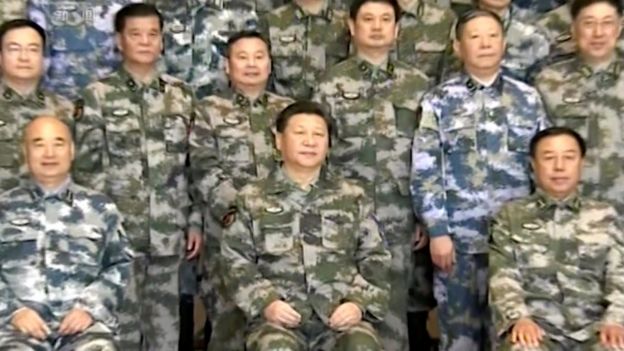China’s President Xi Jinping has taken on a new military title, in his latest move to exert greater control over the armed forces.
Mr Xi is now commander in chief of the military’s Joint Operations Command Centre.
State media showed him visiting the centre wearing camouflage fatigues.
China’s foreign policy has become increasingly assertive in recent years, especially on its claims to disputed territories in the South China Sea.
Mr Xi is already General Secretary of the Communist Party, and chair of the Central Military Commission, which manages the People’s Liberation Army.
Correspondents say that, given Mr Xi’s consolidation of power in China, the move will be interpreted by some as a propaganda message that he is now in absolute control.

As Shakespeare once wrote, what’s in a name?
We probably shouldn’t make too much of the new commander in chief title. The fact that it has been bestowed on President Xi by the country’s state-run media certainly does imply some kind of official approval.
But he was already in military command, everyone knew that, and to most Chinese ears the phrase is unlikely to conjure up the same resonances as it does in English translation, with its obvious link to the seat of US military power.
President Xi is, we’re told, commander in chief of the new Joint Operations Command. It sits at the heart of his vision of a new, leaner, more technically sophisticated Chinese military.
The title, if anything, underlines what we already knew: China is modernising its armed forces fast, and Xi Jinping is at the centre of that change.
During his visit to the centre on Wednesday, which was widely publicised in state media, he said the armed forces should be “absolutely loyal” and “capable of winning wars”.
Experts say his appearance in military fatigues may also be a display of strength aimed at China’s rivals.
China and several of its neighbours are locked in a territorial dispute over the South China Sea, which Beijing claims almost in its entirety.
Apr. 21, 2016 on BBC News
Read more here

